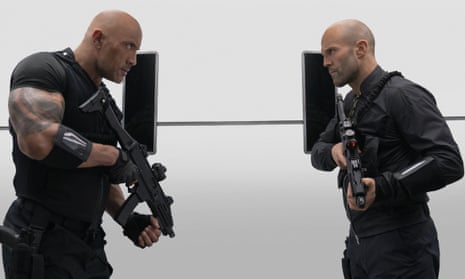Fast & Furious stars’ contracts ensure they receive equal punishment on screen, says producer

Egocentric demands are nothing new on Hollywood sets but producers of the Fast & Furious franchise have revealed its stars have gone so far as to refuse to lose fights against one another.
Members of the team behind the movie series told the Wall Street Journal (paywall) that actors including Jason Statham, Dwayne “The Rock” Johnson and Vin Diesel have contract demands that limit the amount of punishment their characters take in fights.
Diesel, who has been with the long-running franchise from the beginning, reportedly devised a complicated rating system tallying how many times each actor was kicked, punched or headbutted to ensure violence was being doled out equally. It was eventually deemed unworkable, but Michael Fottrell, a producer on five of the movies, confirmed to the WSJ that fights were choreographed so that no one came out looking like the definitive loser.
Diesel’s sister is reported to have been present on set asking if her brother was “going to get his licks back in” after a fight scene during rehearsal. Johnson, who had a successful career as a WWE wrestler before moving into film, is also reported to have requested his character sit down rather than lie on his back after taking a beating in a scene from 2017’s The Fate of the Furious.
Some of the demands have been attributed to tensions between Johnson and Diesel. “It’s not always easy being an alpha. And it’s two alphas,” Johnson told USA Today. Diesel does not feature in the latest release, Hobbs & Shaw, in which Johnson stars alongside Statham and Idris Elba.
“It’s like that old trope where an actor comes in and wants more closeups,” an unnamed editor on the franchise told the newspaper. “They want more muscles.”
Tales of bruised egos and eccentric oneupmanship have long been common among action stars. Steve McQueen and Paul Newman famously clashed on the set of the 70s disaster film The Towering Inferno, with both wanting the same number of lines and top billing on promotional posters. Tom Cruise reportedly had a “no eye contact rule” on the set of The Last Samurai, while Daniel Day-Lewis reportedly said no one with a British accent should speak to him while he was filming Lincoln, in case it put him off.
Christian Bale’s rant on the set of Terminator Salvation is one of the most egregious examples of an action star meltdown and quickly became part of cinematic folklore. The actor became incensed when the director of photography strolled across his eyeline during a take, and threatened to walk off the set in an expletive-filled rant.
Many demands seem to be rooted in the more pragmatic world of career management and self-preservation. Queen Latifah only accepts roles in which her character does not die. “If I die, I can’t be in the sequel,” she said this year.
… we have a small favour to ask. Millions are turning to the Guardian for open, independent, quality news every day, and readers in 180 countries around the world now support us financially.
We believe everyone deserves access to information that’s grounded in science and truth, and analysis rooted in authority and integrity. That’s why we made a different choice: to keep our reporting open for all readers, regardless of where they live or what they can afford to pay. This means more people can be better informed, united, and inspired to take meaningful action.
In these perilous times, a truth-seeking global news organisation like the Guardian is essential. We have no shareholders or billionaire owner, meaning our journalism is free from commercial and political influence – this makes us different. When it’s never been more important, our independence allows us to fearlessly investigate, challenge and expose those in power.
